BibTeX | RIS | EndNote | Medlars | ProCite | Reference Manager | RefWorks
Send citation to:
URL: http://rjms.iums.ac.ir/article-1-592-en.html
Background & Aim: In human environment, magnetic fields are created by electrical generators, power lines, and electrical instruments. These fields could affect learning and memory. This study was planned to evaluate whether short time exposure to magnetic fields has any significant effect on spatial memory. Material & Method: In this experimental study, we used 10 male Albino Wistar mice that were trained for spatial memory in a T-maze model within six days. Twenty-four hours after training, animals were tested for retention of discrimination in three stages(control, restrainer and magnetic field) at two-hour intervals and each of the animals was given 5 successive trials at one-minute intervals. The time of movement from the start area until they reached the criterion zone was measured by a chronometer. Magnetic field was induced by a round coil with an internal diameter of 8 cm and 850 turns of copper wire. Maximum intensity of 7.5 mT at the center of the coil was calibrated by a digital teslameter. Results: Evaluation of the results of the three stages indicated that the mean of time was 15.4 s, 11.5 s, 11.3 s respectively. Also, there was a significant difference between the time in the control stage and the other stages (P<0.05), but there was no significant difference between the restrainer stage and the magnetic field regarding the time measured. Conclusion: Research findings indicated that short time 7.5 mT, 50 Hz magnetic field did not have any significant effect on T-maze alternation tasks in mice and it would probably have no effect on spatial memory process either.





